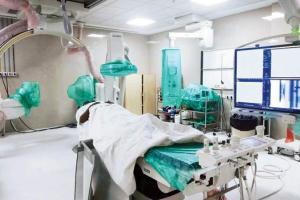With stroke becoming second most common reason for deaths, experts say high-tech lab at Thackeray Trauma Centre is need of the hour

The five-bed attached ICU is a major advantage for the DSA lab as it will reduce time spent in shifting the patient
In a major boost to patient-care for those suffering from brain strokes, aneurysms and bran bleeds, the civic-run Hindu Hruday Samrat Balasaheb Thackeray Trauma Centre in Jogeshwari recently got a world-class Digital Subtraction Angiography (DSA)/Neuro Vascular laboratory with an attached five-bed ICU. The centre was put to use just a few days ago, however, it will take a few more months for it to be available round the clock.
The centre also capable of handling any paediatric neurovascular problems, making it the first peripheral hospital in the suburb to have a state-of-the-art facility. This, at reasonably lower prices than private hospitals.
The corporation has spent over Rs 8 crore towards setting up the laboratory. The DSA laboratory also has an inbuilt CT scan as an additional feature.
All its machines are imported from Germany and the team has been trained on the job with experts.
In addition, the trauma centre already has a team of 10-12 doctors and nursing staff, headed by neurosurgeon Dr Shradha Maheshwari, to run the DSA lab.
Confirming the development, Dr Pinakin Gujjar, Dean of Cooper hospital, who is also in charge of the trauma centre said, "We are sure that the DSA lab will be of much help to stroke patients and during other neurovascular emergencies. KEM and BYL Nair hospitals are the only two civic centres to have this facility and they are already overburdened with patients."
Speaking to mid-day, Dr Maheshwari said, "Though the centre was inaugurated only in September, we have gradually started admitting patients with a known history of neurovascular issues, as the centre would take at least two to three months more to be fully functional."
She added, "Recently, stroke became the second most common reason for deaths. And October 29 is celebrated as World Stroke Day to spread awareness among people about strokes and the importance of early identification, which can prevent major damage to the brain. If treated within the golden hour, it can even reverse the damage."
The attached five-bed ICU is a major advantage for the trauma centre, which other hospitals don't have. "The entire second floor of the trauma centre has been converted into the Comprehensive Stroke Unit," Dr Maheshwari said. The centre has so far treated 10-12 patients through careful planning.
Neurosurgeons opine that developing countries like India are facing the double burden of communicable and non-communicable diseases. Stroke is one of the leading causes of death and disability in India. The estimated prevalence rate of stroke is over 200 per 1,00,000 in rural and over 400 per 1,00,000 in urban areas. Stroke units are predominantly available in urban areas that too in private hospitals. Stroke rehabilitation is not well developed in India due to lack of personnel. Organised rehabilitation services are available in the country but they are mainly in private hospitals of the cities.
Experts speak
Dr PP Ashok
Head Department of Neurology, PD Hinduja Hospital, Mahim
This is the need of the hour. Usually, time is wasted in diagnosing strokes and often, the patients' relatives misunderstand the gravity of the problem. Therefore, we always request public to be aware and insist on remembering the acronym, FAST, where F stands for Face-look for facial changes, A for Arm-weakness in hand or leg, S is for Speech-any difficulty in speaking and if these symptoms are visibly clear, T-time to act and rush the patient to the nearest hospital. Timely medical intervention can reverse the effects of a stroke.
Dr Vernon Velho
Head of the Department of Neurosurgery, Grant Medical College and Sir JJ Group of hospitals
It is a very good initiative taken by the civic corporation. Patients can be treated faster at peripheral hospitals. Shifting to tertiary centres wastes time. On average, per day at JJ hospital, we get around three to four patients with neurovascular problems. The only way to curtail stroke is to have blood pressure and diabetes under control, a change in lifestyle is also recommended.
Catch up on all the latest Mumbai news, crime news, current affairs, and also a complete guide on Mumbai from food to things to do and events across the city here. Also download the new mid-day Android and iOS apps to get latest updates
 Subscribe today by clicking the link and stay updated with the latest news!" Click here!
Subscribe today by clicking the link and stay updated with the latest news!" Click here!









